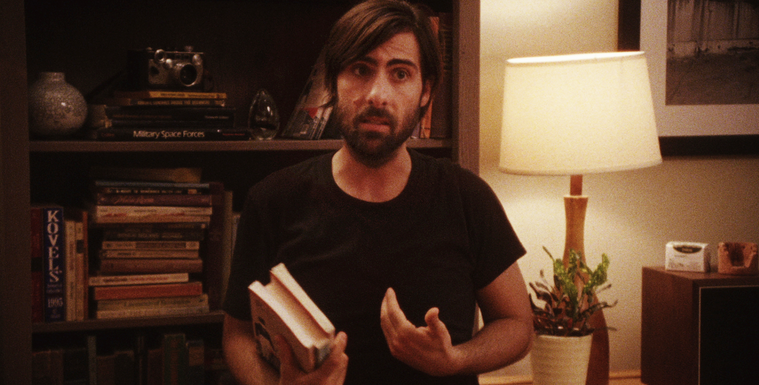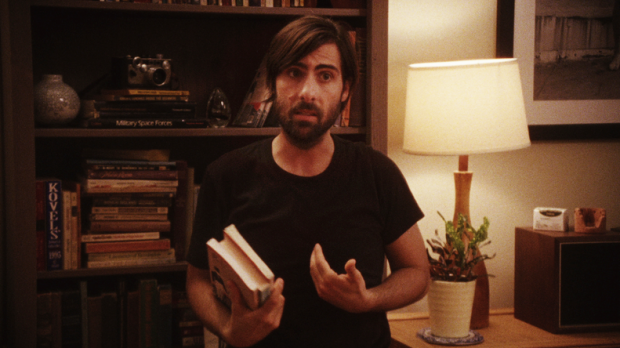
I didn’t expect that it’d be so fitting for us to post an interview with Jason Schwartzman just one day after our talk with Alex Ross Perry. The respective actor and writer-director, with Listen Up Philip, made a collaboration that seems to have gone swimmingly, yet the pair being in-tune with one another runs much deeper than what’s “merely” on the screen. As I learned after posing my first question to the actor — a question that resulted in the longest answer I’ve ever received, no less — their extended pre-shoot time together was crucial to developing the rhyme and rhythm of an elegant character study.
Even when talking over the phone on a Saturday afternoon does Schwartzman come off as far more graceful and friendly than Philip Lewis Friedman. I didn’t feel much of any need to ask about the “struggle” of playing a rakish asshole — the final results sort of speak for themselves, and plenty of other interviewers have that covered — but the way one becomes especially comfortable with it. There’s a tricky balance at play, and his response offers one of the more illuminating insights into an actor’s process I’ve yet been told.
The Film Stage: I wanted to start by asking if you’d seen Impolex and / or The Color Wheel prior to starting work on this film — and, if so, what your reaction amounted to.
Jason Schwartzman: No, I hadn’t seen them, and that’s not a comment on those movies — more a comment on my life. At the time, especially, with being a parent and all this stuff. There was a lot I hadn’t seen, but when the script came, it was sent to me with a DVD of The Color Wheel, and I watched it after I read the script. I really loved it, and not only did I like it as its own movie, but I couldn’t help think about it side-by-side to what I had just read. It’s sort of the movie that it seemed like Alex wanted to make, and that was exciting, because it seemed like it had just enough of that one and just enough of something else — a different type of movie with a whole kind of different spectrum of things he was going after. So that was exciting to me, for sure.
It’s funny to say, but I also think there’s something comforting about knowing he had acted — that he had been in front of a camera and sort of knew what that felt like. I liked that. I don’t think I’d ever really worked with too many directors who had also been in things, so there was something nice about that. It was a great script when I read it and, also, obviously complicated and everything, but it was beautifully written. So no question he can do this — he’s a great writer and all — but this script also seemed so… I don’t want to say “execution-dependent,” but I, personally, was nervous. Like, if I do this movie… which, by the way, I didn’t even know I was doing this, later, when we met, that it was even at that point. I thought I was probably one of many, many, many people he was trying to talk to about, and there was an audition involved, so it probably would have changed the tone of our first meeting a little. But probably not.
Anyway, for me, I have found that you work in all different ways, and each experience is totally different and should be totally different. What really is nice, or helps me, is when I sort of feel connected — like I know the director, or that we have a kind of rapport together. And maybe that just comes from my own way of communicating, anyway, which is just sort of thinking out loud. So, if I have an idea or something, it’s nice for someone like me not to feel so, so, so precious about them, that I could say a lot of bad stuff and have the person not vanish. Obviously, I’ve worked with directors where you don’t have the luxury of being around them a lot, and that’s often. You sort of have to change it. I don’t know why, but I felt, when I read the script, my hope was that Alex and I would have the kind of rapport that I’m talking about, which is more like an exchange of ideas, and a lot of things about judgement and a lot of bad jokes.
When I met him for dinner, within 30 seconds I felt like, “We have to make this movie.” Then, once I was in this movie, our collaboration was the best. It was just so generous of him. I mean, I came a month early, and he’s in pre-production, in the throes of all these other things — all these complicated, logistical things — and he’s also spending every day with me. We really gave ourselves a lot of time to be near each other, to get to know each other, and to share things with each other — like books and movies and records — and also gave ourselves a lot of time to not talk about the movie, but just sort of walk around New York and think about stuff.
You know, it all kind of circles back, and you get so many ideas from things that… “Oh, let’s just take a break and not think about this for a while,” and then something happens. You see something on the street and go, “Oh, put that in the script.” But it was sort of like us going to the script. We wrote every scene out on these note cards and laid them all out so we could have the whole movie in front of us, so we could just talk about it and look at it as a big thing. Essentially, I never had a doubt about anything, but I always felt like I had to ask the dumb questions — things that, maybe, are obvious.“Well, why does he go there afterwards?” And it’s just, like, Alex saying, “Because he goes here,” or, “I don’t know, because…” Whatever. Just to see if. It was fun, and it wasn’t, like, super-intense. It was really just casual, spending hours together, just kind of thinking about stuff, proposing ideas — but, certainly, if we had an idea or a line or something, Alex and I would talk about it. If we were laughing, Alex would usually go home and type something up.
So it wasn’t like a bunch of improving and “let’s remember that for the day.” He would actually make it into a scene. You know, the script is so balanced, in its weird way, that you can’t just start going off the rails, because of all this other stuff. But I think the most enlightening thing that came out of the experience, for me, of that month of being together was that he’s so abrasive, Philip, that part of me was wondering, “Well, is there a version of this where he’s not so abrasive? Is there a way to lose that line? Is there a version where he does this? Let’s talk about these things.” I think, through experimenting, we realized that anything that was added that seemed like it was trying to lighten things up for Philip — make him a little more likable or empathetic — actually worked the opposite way and made him just detestable, because he became super passive-aggressive.
It was just trying to slap a smile on something that, fundamentally, doesn’t want to smile. So I think there was just something cool about having that time. By the way, also the reason for that big time together was that, when we started shooting, there was a lot of stuff to cover in a short amount of time, so we want to make sure we’ve gotten all our bad ideas out of the way, not on-camera. Kind of cross things off. Like, “We’re not going to go there, we’re not going to go there, we’re not going to go there. Here’s what we’re going to be doing.” It was just fun.
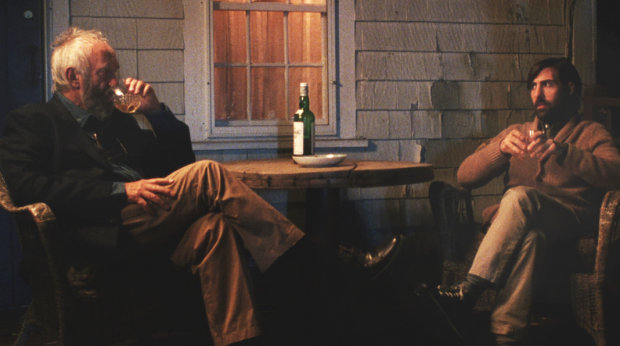
This is funny, because you’ve answered about three other questions I had.
Oh, good.
No, it’s good. One thing I wanted to ask, which I think you’re kind of suggesting, relates to a quote I’d found: you were initially repulsed by Philip, yet kept going back to the script, only being more compelled as the read-through continued. In the process from first read to final shot, how did you become acclimated to him? Was stepping into his shoes easier after this whole pre-production business?
Totally. Yeah, absolutely. I remember, when I was on-tour with my band a long time ago, we’d been through it for almost, like, two years, and we used to do things. We had this inside joke where we would roll our Rs all the time — just that [makes sound of rolling r]. I remember it just became the way we lived. And I came off tour, and I was out having breakfast with, I think, my brother, or something, and there was something on the menu, and I rolled the R. I did it, and no one laughed. I realized, without realizing it, [laughs] that I had become immersed in a whole series of things that are not funny to anybody else but people who know it. You know, you don’t do it on purpose, and I think it’s just that.
I didn’t come to New York a month early to “become” a person; I just came to be close to Alex and be close to the material. If you’re reading something all day long and talking about something all day long, you — without knowing it — start to think about ways and think about things a little differently, more in the atmosphere of the movie. I mean, it was funny: when Elisabeth Moss came to join us a couple of weeks before shooting, I remember we were talking about Philip and Ashley. She said something about the way Philip did something, and I took it personally. I remember saying, “That’s not exactly how it happened. Your character wasn’t really easy to be with at times.” She said, “Are you kidding?”
And we got into a fight about these people, but it was way more of an intellectual sparring, with smiles. Because I was saying, in-between it, “I can’t believe I’m defending this behavior.” It wasn’t like I was arguing as someone, but, “It’s so crazy, Elisabeth. I really am struggling to see your point-of-view on this, and I know that’s wrong.” I’m like a half-vampire or something. I’m half-me, and I’m arguing for something that is insane. Like, there’s no way you can say a lot of this stuff is right, and yet I just didn’t see it any other way. So it was really fun to sort of get into that zone — with her, especially.
So you’re immersed in the character’s mindset. When I spoke to Alex, I brought up the film’s “literary” qualities and roots. I’m wondering if he recommended any specific books to help get you into that shape.
Yes, he did. The “one” that he said, “If you’re going to spend a month reading something before this movie, read this” was a book called Young Hearts Crying by Richard Yates. It’s a beautiful book that shares many things with our movie. Obviously, it’s a totally different thing, but it has a young couple, showing the decay of love and respect, and also going off with them on their own, for a little bit — but all kind of happening in a non-flashback scenario, really. So that was one. I got some Jonathan Franzen, audiobooks of his essays, just because he loves Franzen and I love books on tape. He’s extremely verbose, and is just a good talker. That’s something that was there.
I got some Philip Roth, but really didn’t read it so much as I just had it near me. I didn’t buy it, because this isn’t based on a Philip Roth thing exactly, but that’s Alex’s favorite writer, without a doubt, and so it would be silly not to just have that around. So I had him, and I would just kind of sleep with him next to the bed, or I always had him in my backpack, and I would just thumb through them and just kind of have them — more as a thing for the ether. But I’m a slow reader, and there just wouldn’t have been time to get into that. Also, the task of trying to learn all the lines and stuff was a big undertaking, anyway, so I just kind of had to focus my time.
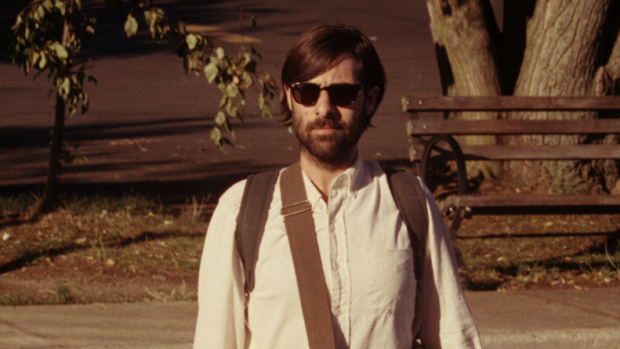
This is a bit unorthodox, but one of my apartment mates really wants to mention a specific thing, so… if that’s —
Give him to me.
Daniel Dickerman: Hello, Jason.
Hi! How are you?
Pretty good. How about you?
Good. Thanks.
I always loved the show you and Jonah Hill did in 2008 on Indie 103.1, when you subbed for Jonesy’s Jukebox.
Oh, thank you so much! It’s great hearing that. That was so fun.
Your band, Coconut Records, makes obvious that you have passions extending outside cinema. What music do you happen to be into right now?
Well, always, there’s so much music, and the great thing about music is that it’s so portable that you can have it on-the-go all the time. So I’ll open my iPhone and I will tell you what I’ve got. There’s the new stuff, the new Caribou album I’ve been listening to, but I’ve been spending a lot of time with… are you familiar with Steve Gunn?
No.
He’s a great musician, so I’ve been listening to that recently. How about you?
I’ve been into The Orwells a lot lately.
Oh, good. They’re great.
That and Jack White, I guess.
Oh, cool. Lazaretto!
I saw him at Radio City a few years ago, where he stormed off the stage, so I sort of put that down for a little bit.
Oh, really? Huh. Shit. Well, I don’t know.
Anyway, thanks.
Yes, of course! Steve Gunn: check him out.
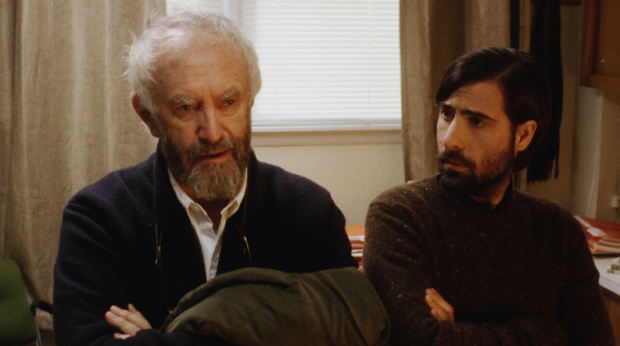
Listen Up Philip will begin a limited release on October 17 and hit iTunes on October 21.

